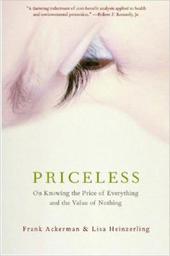
|
Priceless: On Knowing the Price of Everything and the Value of Nothing
Paperback / softback
Main Details
| Title |
Priceless: On Knowing the Price of Everything and the Value of Nothing
|
| Authors and Contributors |
By (author) Frank Ackerman
|
| Physical Properties |
| Format:Paperback / softback | | Pages:290 | | Dimensions(mm): Height 203,Width 134 |
|
| Category/Genre | Economic theory and philosophy |
|---|
| ISBN/Barcode |
9781565849815
|
| Classifications | Dewey:330.01 |
|---|
| Audience | |
|---|
|
Publishing Details |
| Publisher |
The New Press
|
| Imprint |
The New Press
|
| Publication Date |
1 January 2004 |
| Publication Country |
United Kingdom
|
Description
An economist and a law professor debunk the use of cost-benefit analysis in deciding whether human life and the environment are worth protecting. Engaging: A great approach to a potentially dry topic: instead of talking about "deregulation," the authors talk about how much we are willing to pay to save animals on the verge of extinction, the rights of phone-talking drivers versus the rights of people they tend to hit, why we spend a disproportionate amount of research energy on diseases that afflict wealthy men in their 70s. Written by a lawyer and an economist, Priceless argues that the politically fashionable and wide-spread practice of applying cost-benefits analysis to subjects including environmental protection, health, and conservation is inappropriate and misguided. Issues of life and death - protecting the ozone, deciding whether or not to ban cell phone use while driving - call for informed public debate beyond market-based assessments of whether such measures are "a good investment." Debunking both the overall concept of cost-benefit analysis and the fuzzy myth behind it, Priceless is the first comprehensive rebuttal of the Bush administration's anti-regulatory legislation. There is no meaningful monetary price for life or nature, say economist Frank Ackerman and law professor Lisa Heinzerling in their critique of recent market-based assaults on health and environmental protection. Though cost-benefit analysis sounds like a reasonable way to gauge the extent to which we should regulate smoking or water quality, when applied to "priceless" concepts such as childhood disease or the value of a stable climate in years to come, the paradigm is misguided. In nine chapters, from "Prices Without Values" to "An Ounce of Prevention" to "Values without Pricing," the book tells us how legislators today are turning away from environmental protection and regulation and are choosing instead to let the "all-mighty" market determine the value of life. Arguing that number-crunching should never replace thoughtful, democratic discussion of policy, the book also includes a particularly timely discussion of why only military expenditure is afforded the kind of moral weight the authors wish was put on other issues.
Author Biography
Frank Ackerman is an economist at the Global Development and Environment Institute at Tufts University. He has served as a consultant to various environmental and regulatory agencies. He is the co-founder of Dollars and Sense magazine. Lisa Heinzerling is a professor at Georgetown University Law Center in Washington D.C. As Frank Ackerman and Lisa Heinzerling point out... it is hardly clear why the same logic [of short term investments] should apply to the value of our great-grandchildren. - The New York Times Magazine Ackerman and Heinzerling combine sophisticated criticism and a provocative policy perspective with an accessible style and an eye for contemporary political issues.- Harvard Law Review A damning indictment of cost-benefit analysis applied to health and environmental protection. - Robert F. Kennedy Jr
Reviews"As Frank Ackerman and Lisa Heinzerling point out . . . it is hardly clear why the same logic [of short term investments] should apply to the value of our great-grandchildren." -Jim Holt, The New York Times Magazine "Ackerman and Heinzerling combine sophisticated criticism and a provocative policy perspective with an accessible style and an eye for contemporary political issues." -Harvard Law Review "If you've ever wondered where some really bad ideas-more arsenic in your water, say-could have come from, this book will provide the answers." -Bill McKibben, author of The End of Nature
|